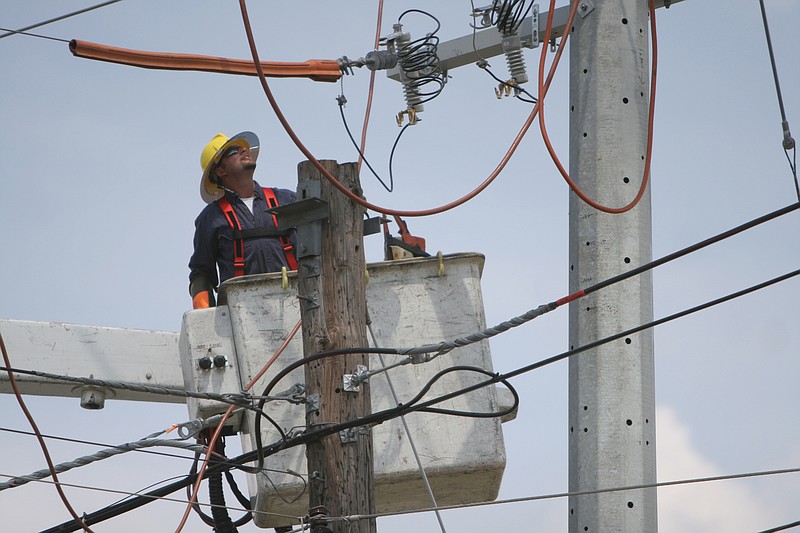Debby Williams, a certified public accountant, bought what she thought would be a dream 3-acre home in southern Bradley County in 1978 to raise and home school her three children.
But she discovered the rural area - served by Volunteer Electric Cooperative for power and Verizon for telephone - lacks any broadband telecommunication connections for her to do her accounting work or for her children to effectively take Internet education courses. When she decided to move to get better Internet links, she quickly found out the value of high-speed broadband service to prospective homeowners as well.
"We had three offers for our house fall through after the buyers realized we didn't have any broadband service," Williams recalled. "We finally sold our house (in 2012) for $50,000 less than the original offers we had. Not having broadband is not not debilitating for doing remote work or online education, it cost us a tremendous amount of money."
Williams was among more than 200 rural Hamilton and Bradley county residents who packed a fire training center in Ooltewah Thursday night to organize support for legislation to allow EPB and other municipal broadband suppliers to expand their high-speed Internet service beyond their TVA-designated power service territory.
EPB this month introduced one of the world's first residential 10 gigabit-per-second Internet service plans across its 600-square-mile service territory, which includes 170,000 homes and businesses in most of Hamilton County and parts of Marion, Catoosa and Walker counties. But more than 8,500 homes in northern Hamilton County lack the ultra high-speed Internet service because they are outside of EPB's service territory. EPB is statutorily barred from serving those rural areas.
"I'm in a dead zone for broadband and we need EPB service," said Bill Perry, who lives on a 15-acre farm in northern Hamilton County and has to pay $225 a month for slower Internet service from Verizon and another $120 a month for Dish satellite TV.
Although the Federal Communications Commission has struck down the territorial limits imposed in Tennessee and other states on municipal broadband providers, the Tennessee attorney general has challenged the FCC ruling and many Tennessee lawmakers don't want government utilities trying to expand and compete against private businesses and utilities.
Legislation introduced earlier this year to allow EPB and a half dozen other municipal utilities to expand their broadband service into neighboring areas failed to get out of committee in the last General Assembly session. Conservative think tank groups such as the Beacon Center in Nashville claim that government utilities that don't pay corporate income taxes and borrow at lower interest rates have an unfair advantage competing against private businesses.
Critics of municipal broadband note that when such government ventures fail, taxpayers or electric ratepayers are on the hook as occurred with at Memphis Light Gas and Water, which lost more than $28 million of ratepayer funds in a failed telecom venture called Memphis Networx.
EPB's success with its fiber optic network, which now provides telecom services to more than 76,000 customers, is due, in part, to more than $111 million the city-owned utility got in 2009 from the federal stimulus program.
State Rep. Mike Carter, R-Ooltewah, said he was one of the opponents of municipal broadband when he was first elected to the Legislature in 2012. But he said after talking with EPB and seeing the advantages of high-speed broadband, he said he "would rather be right than idea logically conservative."
EPB has a self-funding telecommunications system that actually pays the power system for services that help keep electric rates lower, Carter said. EPB is also Hamilton County's largest property taxpayer with an annual tax bill of more than $19 million.
Carter said private telecom providers such as AT&T are paid by the federal government under the FCC universal access fund to extend broadband service into rural areas. EPB is willing to do that without such taxpayer support.
"If it's wrong for EPB to take $111 million of federal stimulus funds, then why is it right for AT&T to get $156 million in federal funds (from the FCC access fees) to extend broadband service for 81,000 Tennesseans?" Carter said. "It's crony capitalism for some of these private telecom companies."
State Sen. Todd Gardenire, R-Chattanooga, was among the elected officials who came to the Thursday night rally in support of legislation that would allow EPB to broaden its broadband service. Such legislation will be sponsored in the General Assembly again next year by Rep. Kevin Brooks, R-Cleveland, and Sen. Janice Bowling, R-Tullahoma.
"It's going to be an uphill battle and we have our work cut out for us," Gardenhire said, noting that his GOP counterpart from Chattanooga, Senate Speaker Pro Tempore Bo Watson, is against the measure.
Developer John Thornton, who is eager to bring EPB's high-speed Internet to his Jasper Highlands projects in Marion County, said such service is critical not only for residential and economic development but for online education.
"How in the world do we expect our children to be kept up to speed when we don't give them access to the speeds to keep up," Thornton said.
Contact Dave Flessner at dflessner@timesfreepress.com or 423-757-6340.
